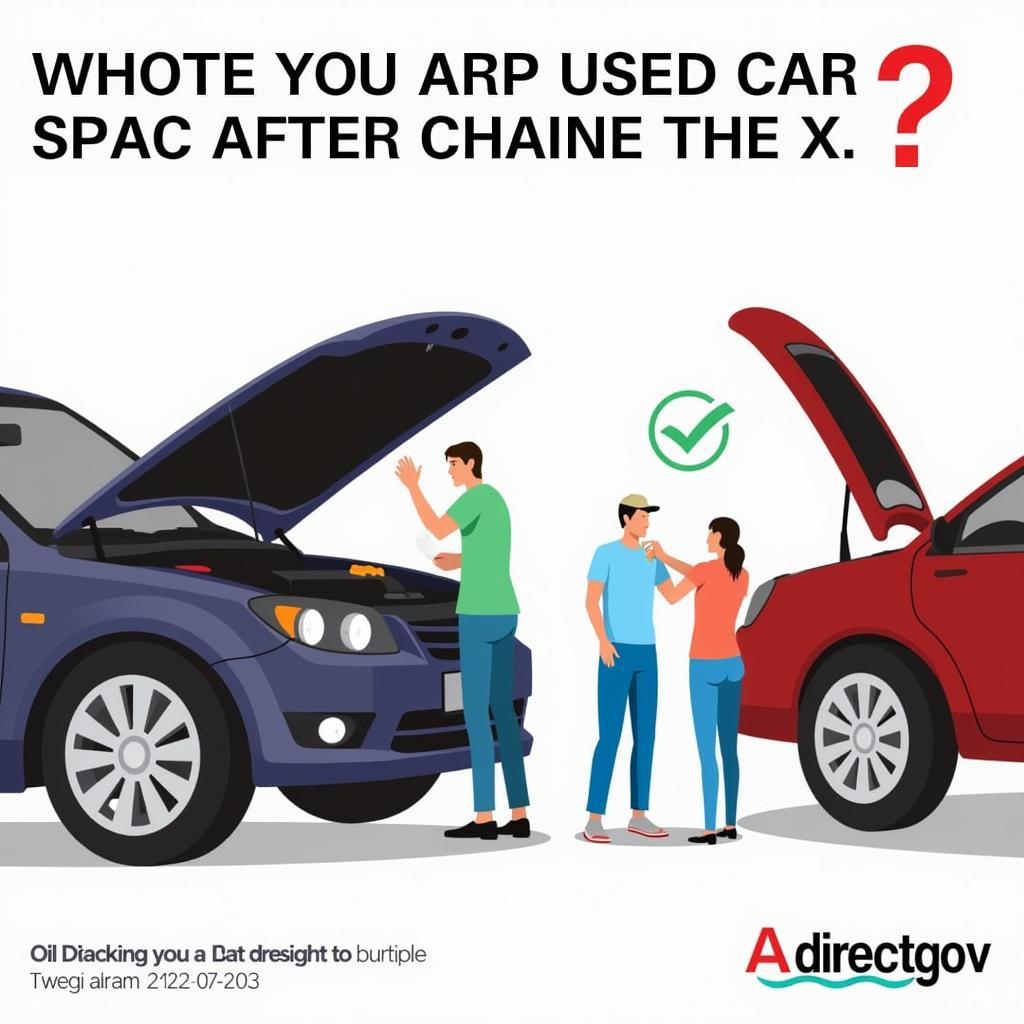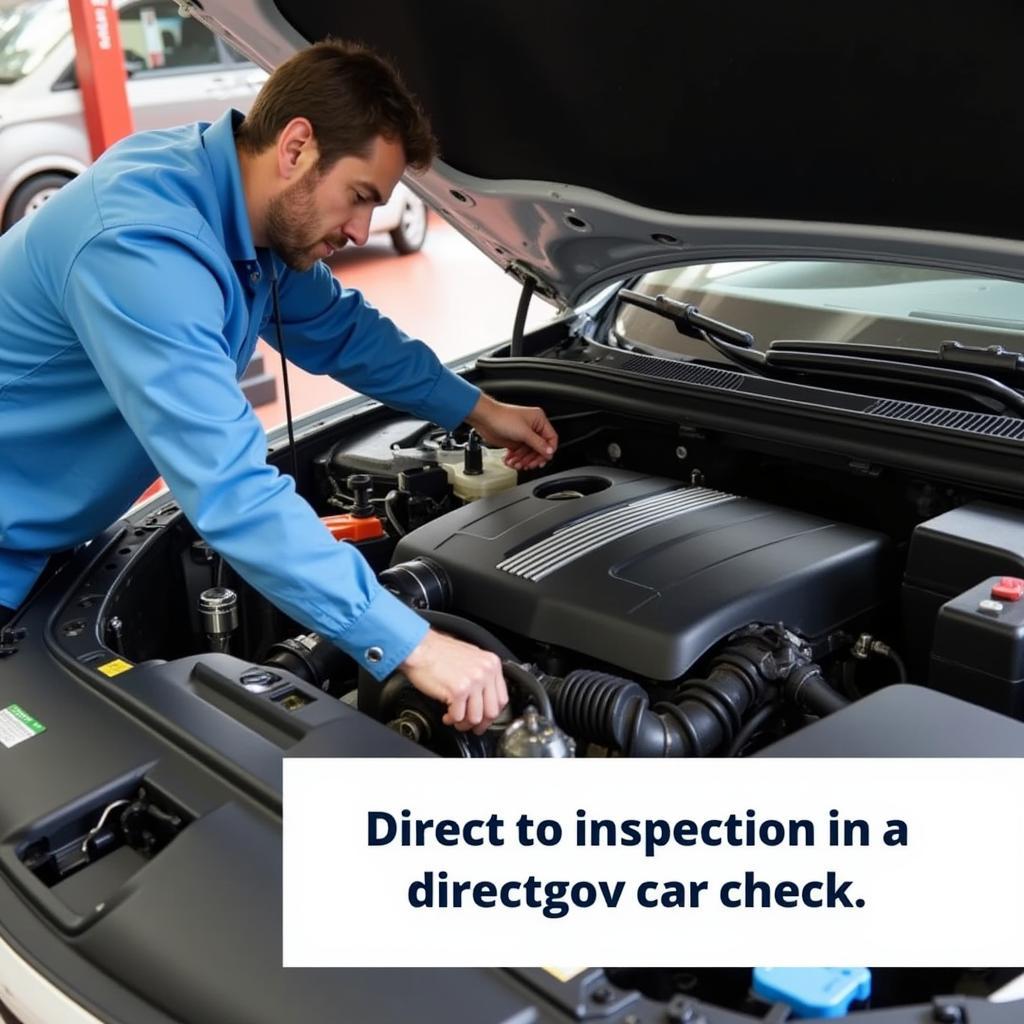Using directgov to check car details is a crucial step when buying a used car. It provides essential information about the vehicle’s history, helping you make an informed decision and avoid potential pitfalls. This guide will walk you through everything you need to know about using directgov (now known as GOV.UK) to check car details, ensuring you’re equipped with the knowledge to buy with confidence.
Understanding the Importance of a Directgov Car Check
Before handing over your hard-earned cash, it’s vital to conduct a thorough vehicle history check. A directgov car check, through the GOV.UK website, offers valuable insights into a car’s past, including MOT history, mileage, tax status, and any outstanding finance. This information empowers you to assess the car’s true condition and value, protecting you from unforeseen expenses and legal complications.
What Information Can You Get from a Directgov Car Check?
A directgov car check, now accessed via the DVLA’s vehicle enquiry service on GOV.UK, provides a wealth of information:
- MOT History: Review the car’s MOT history, including pass and fail certificates, advisories, and mileage recorded at each test. This helps identify potential recurring issues and verify the mileage’s accuracy.
- Vehicle Tax Status: Confirm if the vehicle’s tax is up to date. Driving an untaxed vehicle is illegal and can result in hefty fines.
- Mileage Information: Compare the mileage declared by the seller with the recorded MOT history. Discrepancies can indicate potential mileage tampering.
- Registered Keeper Information: Verify the seller’s ownership and identify any inconsistencies in the vehicle’s history.
- Outstanding Finance: Discover if there’s any outstanding finance on the car. Buying a car with outstanding finance can lead to repossession.
- Vehicle Details: Confirm details such as the make, model, colour, and engine size. This helps ensure the vehicle matches the seller’s description.
How to Perform a Directgov Car Check on GOV.UK
Performing a car check on GOV.UK is straightforward. Simply visit the DVLA’s vehicle enquiry service page and enter the vehicle’s registration number. For a small fee, you’ll receive a detailed report containing the information mentioned above.
Why is Checking Car Details Crucial?
Think of it like this: you wouldn’t buy a house without a survey, would you? A directgov car check is the equivalent of a house survey for a car. It provides vital information that helps you make a sound investment and avoid potential headaches. Ignoring this crucial step can lead to costly repairs, legal issues, and ultimately, a bad deal.
 Inspecting a Used Car Before Purchase
Inspecting a Used Car Before Purchase
Beyond the Directgov Check: Further Steps to Protect Yourself
While a directgov car check is a valuable tool, it’s not the only step you should take. Consider these additional measures:
- Professional Inspection: A mechanic can provide a more detailed assessment of the car’s mechanical condition.
- Test Drive: Take the car for a thorough test drive to evaluate its performance and handling.
- HPI Check: This provides further information on the car’s history, including whether it’s been stolen, written off, or involved in accidents.
“A comprehensive car check is essential for any used car buyer,” says John Smith, a leading automotive expert. “It’s a small investment that can save you a lot of money and hassle in the long run.”
 Mechanic Inspecting a Car Engine
Mechanic Inspecting a Car Engine
Conclusion: Make Informed Decisions with Directgov Check Car Details
Checking car details using the DVLA’s services on GOV.UK is paramount when purchasing a used car. It equips you with essential information, allowing you to make informed decisions and avoid potential problems. Don’t take chances with your investment – perform a directgov car check and protect yourself from costly surprises.
FAQ
- What is the cost of a directgov car check? The cost varies depending on the specific information requested. Check the GOV.UK website for current pricing.
- Where can I find the directgov car check service? The service is now available through the DVLA’s vehicle enquiry service on the GOV.UK website.
- What if I discover outstanding finance on a car? Do not purchase the car. Contact the finance company directly to resolve the issue.
- Is a directgov car check the same as an HPI check? No, they are different services. While both provide valuable information, an HPI check offers additional details such as accident history and stolen vehicle checks.
- How long does it take to receive the results of a directgov car check? The results are usually available instantly or within a few minutes.
- Can I check the car details of a vehicle I already own? Yes, you can use the service to check the details of any vehicle registered in the UK.
- What if the seller refuses to provide the vehicle registration number? Be wary. A reputable seller should be happy to provide this information.
Common Scenarios
- Buying a car from a private seller: Always conduct a directgov car check to verify the information provided by the seller.
- Buying a car from a dealership: While dealerships often perform checks, it’s still advisable to conduct your own directgov check for peace of mind.
- Importing a car: Check the specific regulations and requirements for importing vehicles into the UK.
Further Reading
For more information on buying used cars, check out our other articles on vehicle inspections, financing options, and negotiating tips.
Need assistance? Contact us via WhatsApp: +1(641)206-8880 or Email: [email protected]. Our customer support team is available 24/7.

Leave a Reply